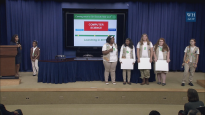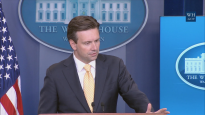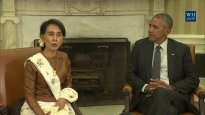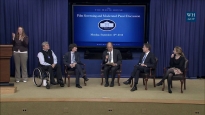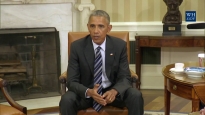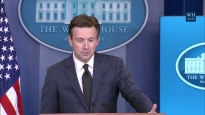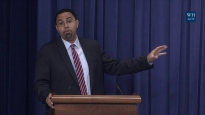The First Lady Announces New Funding for Military Families
January 26, 2010 | 26:24 | Public Domain
First Lady Michelle Obama announces that the President's 2011 budget will include a record $8.8 billion for military family support programs in remarks to the Joint Armed Forces Officers' Wives' Luncheon.
Remarks by the First Lady at the Joint Armed Forces Officers' Wives' Luncheon
1:00 P.M. EST
MRS. OBAMA: Thank you, everyone. Thank you so much. All right, everyone, take a seat, and have a glass of wine -- (laughter) -- all right, because I'm going to sell you guys out. (Laughter.) They were passing around a little glass, and I was like, what's that? (Laughter.) So please feel free. Don't wait till I leave when the desserts come out to get the wine. (Laughter.)
I'm really thrilled to be here. Thank you, Holly, for your kind introduction and for your support of our Air Force families and for all the work that you've done to put together this luncheon, as well as the entire committee. I know that it's hard enough to pull off something like this, but then you invite the First Lady --and all my stuff -- (laughter) -- and it becomes a little bit harder. But this is absolutely wonderful. I've had a great time, and I'm just thrilled to be here. So again let's give Holly and the entire committee a big round of applause for all the work that they've done. (Applause.)
And I'm going to be especially nice to Holly because her husband commands the Air Force District of Washington. So he not only keeps the skies of Washington safe, but he's responsible for when my husband comes back on Air Force One. (Laughter.) So Holly, you and me, we've got to get together -- (laughter) -- and get this thing worked out.
But it's really an honor to be here with all of you. I also want to thank Elizabeth Biddle for the invocation, as well as the beautiful rendition of the national anthem. I want to thank all of you at JAFOWL, the committee, for this, you know, just wonderful invitation and for bringing us all together.
As we saw earlier, doing the medley, which you all got really fired up about, I like that -- (laughter) -- we see that Army, Navy, Air Force, Marines, Coast Guard -- Active, Guard and Reserve –- we all are one force and we're all one family. And you always feel it when you're in a room full of wonderful spouses.
And it's also great to see so many familiar faces, people that I've worked with over the course of the year -- Becky, Deborah, Mary, Sandee and others, all the wives of the Joint Chiefs of Staff -- women who do so much for our military families and who I'm very proud to call my friends.
In fact, we just had a few of you guys over for dinner last week. We had the Joint Chiefs, the combatant commanders and their spouses over for dinner a few weeks ago at the White House. And it was a wonderful evening, very inspiring, because we shared the evening with several wounded warriors. So it was wonderful to have you at my home, and I'm happy that we're switching the tables today.
Now, I know this is the Joint Armed Forces Officers’ Wives’ Club, but today I want to start by thanking you, not simply because of who you're married to, but because of what you do every day, because of the spirit of service that's defined your entire lives.
You all are truly leaders in your own right. And I don't know if you hear that enough, but it's real. You are the vital link between your husbands and the troops they command, making sure their needs and those of their families are heard and met. You're often that mom away from home, the person that other military wives go to for advice and support. And it's always amazing because you do all of this for other families even as your own families serve. For that alone, you all deserve this nation's unending gratitude.
But, you not only provide support to your husbands and to other families. Many of you have also watched your own sons and daughters put on the uniform and go into harm's way. And you've experienced all the emotions that come with that -- all the worries, all the anxieties, but also that incredible pride.
So I want to particularly thank all of the Blue Star moms who are here today, and I'd like to have you all stand. Thank you. (Applause.)
And I also want to salute another remarkable group of women who I know here today -- the women, who for nearly 40 years, have made sure that no American is ever buried alone at Arlington National Cemetery. Please join me in thanking the Arlington Ladies. Please stand, ladies. (Applause.)
And finally, some of you not only married someone in uniform, but we sometimes don't remember that many of you also wore a uniform yourself. You volunteered, you served, you defended our freedoms. So, please, would all the women who served in the armed forces please stand and be recognized. Yay! (Applause.) To all of you, thank you. Thank you for your service to this country.
So the President and I, as you've heard, and our daughters, we've been in the White House for a year now. (Laughter.) It's been a year. As a mom, I often say my priority this year has really been the girls -- making sure that they make this transition smoothly -- as smoothly as possible. I mean, you think about it, these little girls, they've had to get adjusted to a new city, a new house -- it's a nice house, but it's still a new house -- (laughter) -- to a new school and new friends.
And so when people ask me what I'm most proud of this first year, I usually give them two responses. I usually say, first, as a mother I am most proud that our two girls have made that adjustment and they've built a new life here and are happy and healthy, and as I say, as normal as they could possibly be under these circumstances. I joke that I still recognize them. (Laughter.) So that's a good thing.
Then the other response is as First Lady. And I tell people that at the top of the list of priorities that I've had over this year, it's been the time that I have spent highlighting the service of our incredible military families.
And that's what I want to talk about today with you. I want to talk about what you do for America and also what America needs to do for all of you.
From day one, this has been a mission of mine, along with the Vice President's wife, Dr. Jill Biden -- my dear, dear friend and a Blue Star mom herself -- who has been a tireless advocate in support of our extraordinary National Guard and Reserve members and their families. Jill and I have been working hard on this. One of the first things that we wanted to do was to first listen and learn.
So with many of you we had a series of roundtable discussions -- thank you all -- with our military spouses. We met with Deborah and Sandee and other wives of the Joint Chiefs to get their advice and guidance on how to develop our initiatives, and that was incredibly helpful. We also met with the senior enlisted advisors' wives to discuss what's working in the ranks and what also could be improved.
These conversations gave Jill and I just really critical guidance and insight for what would be our subsequent visits to bases and military communities around the country.
And as I think back on all the incredible experiences of this past year -- and we have had many -- I've met the Queen, the Pope -- we've done a lot -- (laughter) -- I have to say that those visits to the military bases have been one of my greatest privileges as First Lady, truly. Through these interactions that we've had, I've gained an even greater level of respect and gratitude for our troops and their amazing families. It is a sight to see.
I remember visiting the soldiers and their families at Fort Bragg, one of my first visits with Charlene Austin -- and we were just talking about that. She hosted me for my first visits. And there I saw firsthand the toll that these wars have taken on these soldiers who have carried so much of the burden of the wars in Iraq and Afghanistan.
I will never forget the families that the President and I met at Fort Hood after suffering such a horrible tragedy. They showed us incredible strength -- the strength that binds Army families together. I remember the sailors and their families at Norfolk, and what a thrill it was for me to share their excitement as we welcomed home the crew of the aircraft carrier, the USS Eisenhower, and the hospital ship Comfort. They were coming back from treating patients and delivering health care and humanitarian assistance across the Americas, including Haiti.
And as we all know, only after a few short months at home, the Comfort is back in Haiti, along with many other branches of our military, delivering aid with their civilian counterparts, helping the Haitian people, and all the while showing the very best of America and making us all so proud.
I remember visiting the airmen and women and their families at Eglin Air Force Base where some of the pilots and crew had just returned from Iraq; it was their sixth deployment in as many years.
I think of the Coast Guardsmen and women who will serve aboard the new cutter that I am proud to sponsor, the Stratton, which honors Commander Dorothy Stratton, who led the SPARS during World War II. (Applause.)
And I can never forget our Marines, who are a part of our daily lives at the White House in a very special way. And we see them display the same professionalism in our home every single day that defines their service around the world. They are a joy to have in our lives.
And then we can never forget our wounded warriors -- the inspirational men and women that the President and I have welcomed to the White House and those we have met all around the country.
Unfortunately for too many of them, the battle continues even after they come home. They are the servicemen that I met at a VA hospital in the Bronx, working so hard to get back on their feet, and in some cases to get back to their units. That's all they cared about.
They're the patriots like the young Navy SEAL who joined us at the Joint Chiefs dinner last week at the White House. This young man attended the dinner with his little sister. I got to sit next to them. She was a nurse who moved to Washington to care for her brother -- left her career behind. And he explained to me how he stepped on an IED in Afghanistan and lost both of his legs. Then just four months later he finished a half-marathon. The courage -- yes -- (applause) -- the courage and the optimism of both he and his sister was breathtaking. Their continued love of life and of country was something to behold.
And I will always remember all of the wives and husbands, all the moms and the dads that the President and I have met at Arlington on Memorial Day and Veterans Day and all around the country -- spouses who've lost their best friend in the world; parents who have laid their children to rest.
And as a wife, as a mother, I simply cannot imagine the depths of their pain and loss. Yet every time I meet them, they show a strength and a resolve that always leaves me in awe. Their sacrifice reminds us all that our men and women in uniform, as well as their families, are our nation's greatest military asset.
So at every one of these visits that I've had, collecting these memories, my goal has been simple. First, to listen. Listen to those voices, listen to those concerns, listen to those needs.
The second goal is to share what I've heard with a team of dedicated leaders who also care deeply about military families -- from the President, the Vice President, to Secretary Gates, to Admiral Mullen, to leaders down the chain of command. These people care deeply.
And finally, my goal has been to work hard to ensure that the concerns and needs that we hear actually lead to some real change coming out of Washington, because the quality of the lives of our military and their families means a great deal, because in the history of our all-volunteer force, we have never asked so much of so few.
We've seen the huge burden of eight years of war on our troops -- tour after tour, year after year, missing out on moments that every parent treasures: a baby's first steps, the first words, the day the training wheel comes off the bike, birthdays, anniversaries.
We've seen the sacrifices of families on the home front -- spouses back home left to do the parenting of two, juggling play dates and ballet recitals and practices; keeping the household together all on their own; holding down jobs -- all the while trying to hide their own fear and worries when the kids look up and ask when mommy or daddy are coming home.
And somehow despite everything that's going on in your lives, military families still find the time to serve others -- coaching Little League, running the PTA, making Christmas special for kids with Toys for Tots, volunteering at churches and hospitals, mentoring young people, being role models in your own right. You just keep on serving -- keep on serving your communities, keep on serving this country.
And all of you, our troops and families, you do your duty and you do it without complaint. No complaint here, right? (Laughter.) You give your all and ask very little in return, only that we back you up so our troops can do their job.
That's why my husband and his administration have worked to do right by our armed forces and their families; to be there for you like you have been there for us; to lighten your load as you have lightened all of ours.
Because of your willingness to advocate for change, all of you here, some really important progress has been made in just one year. Deborah -- Deborah Mullen -- has been telling me ever since we met that just like our troops, our spouses also need the very best support and counseling. Many of you share the need to reduce the stress of long deployments and to give our troops more time home between deployments.
So this is what happened. My husband heard you, and moved to increase the size of the military. That's why his first budget included pay raises and funding for better military housing and more money for child care, in addition to more funds for career development, counseling and support for spouses.
Last year's budget also included money to improve care and treatment for our wounded warriors, especially those with post-traumatic stress and traumatic brain injury.
And the budget increased major -- it made major increases in funding for veterans' health care, including women veterans, plus the largest increase in the VA budget in more than 30 years.
And something that I'm especially proud of that we just talked about at the table, the President worked with the Congress to extend the Family and Medical Leave Act to all our military families and to caregivers of our wounded warriors, because just like other Americans, our military spouses need to care for their loved ones without fear of losing their jobs. This commitment to our forces and their families continues today.
And I'm happy to announce that the President's 2011 budget that he'll introduce next week will further increase funding for military family support programs by more than 3 percent to a record $8.8 billion. And this increase is going to include funds for counseling and support for spouses and families, including our Guard and Reserve families, to the tune of $1.9 billion. It includes $1.3 billion to reduce shortages in military child care and to keep our military child care among the best this country has to offer -- that's something that I got to see -- because we can't forget that military kids also serve in their own special way. We can't forget these kids.
They're just like any other child in this country, except for the fact that their lives are turned upside down every time their mom or dad has to go halfway around the country, risking their lives so that all our children can enjoy the freedoms of this democracy.
It is so incredibly hard for these kids. As a result, they often experience more anxiety; they can have a harder time focusing at school; they can have a higher risk of depression. So we can never forget just how much these wars affect our military kids, and we all have an obligation to ensure that these kids have the support they need at home and at school.
So I'm proud to announce that this year's budget will include more money for youth programs for military kids. And then, at the direction of Secretary Gates, the budget will also include funds to improve and build new DOD schools, from Georgia to Germany. And this is all part of a major effort -- (applause) -- this is part of a major effort over the next five years to renovate or replace more than half of our DOD schools, which will benefit tens of thousands of children from military families.
In response to one of the top concerns expressed by military spouses, this year's budget will also include $84 million for spousal career development, including tuition assistance and federal internship programs. Yay. (Applause.)
And I want to thank all the Coast Guard spouses who spoke to me about housing challenges -- yes. (Laughter.) As a result, the President's budget will include $14 million in new funding for quality Coast Guard housing. And I know that's a big one. (Applause.)
These are all major investments, and they are the result of military families speaking up and being heard. And they are part of a larger ongoing commitment to care for our troops and their families even after the fighting ends.
But in addition to good government and funding, supporting our troops and their families requires active citizens. That's why I've made it a priority to keep asking all Americans to join the cause of supporting our military families. And that's why last Veterans Day, Jill and I helped launch Mission Serve -- a national network that brings civilian and military service groups together to help support our troops and families. But this network also encourages communities to tap that incredible spirit of service of our military families, as well as the talents of our veterans.
We're asking Americans to engage and support military families any way they can, from business owners helping veterans and military spouses find a job or develop skills, to professionals in areas such as mental health and law offering their services pro bono, to ordinary folks out there doing simple things like driving a carpool or offering to babysit or making a home-cooked meal for a military family in their own community. Our men and women in uniform and their families sacrifice for us, every single one of us, so every single one of us can do something in return, even if it's something as simple as saying thank you.
Last spring, I had the opportunity to thank one of those military families during a visit to the White House. Staff Sergeant Robert Henline was deployed to Baghdad with the 82nd Airborne Division out of Fort Bragg when a massive explosion destroyed his Humvee, and he was the sole survivor and suffered terrible burns over more than a third of his body. Well, back at Fort Bragg, his wife Connie had to leave their three kids with family and she made the trip to a hospital in Texas to care for her husband.
So day after day and month after month, Connie stayed by his bedside. She fed him and she tended to his wounds, helped him through dozens of painful surgeries. And that's one story, part of the story, because back at home, their oldest daughter, Brittany, helped to hold the family together. And overnight, she went from being a 15-year-old teenager to a mom for her younger brother and sister. She had to get her driver's license early so she could run errands and do the shopping. She made the meals, she did the laundry, she helped with homework -- yes, a 15-year-old. And at night, her younger siblings would crawl into Brittany's bed and seek the security that they would get from their mother.
So when Operation Homefront named Brittany their Military Child of the Year, the President and I were honored to welcome the whole Henline family to the White House: the father who had endured such horrible injuries, the wife who never left his bedside, and Brittany, the daughter who grew up faster than she had ever planned.
And when a reporter asked Brittany how a teenager could take on so much responsibility, she did what you all do. She didn't speak of herself, but she spoke of her younger brother and sister. And she said simply, "They needed me, and my priorities changed. My family came first."
So you see, that is the strength and the spirit and courage that our military families display every day. You put your own priorities aside, you take care of one another, and you take care of this nation. So as First Lady, I cannot thank you all enough for that sacrifice, and I promise you that I will use every ounce of my energy and being to make sure that America always takes care of you.
So thank you, thank you so much. Thank you for having me here, and have some wine. (Applause.)
END
1:25 P.M. EST
|
September 14, 2016
|
September 14, 2016
|
September 14, 2016
|
September 14, 2016
|
|
September 12, 2016
|
September 12, 2016
|
September 12, 2016
|
September 12, 2016
|
- &lsaquo previous
- …
- 23
- 24
- 25
- 26
- 27
- 28
- 29
- 30
- 31
- …
- next &rsaquo
